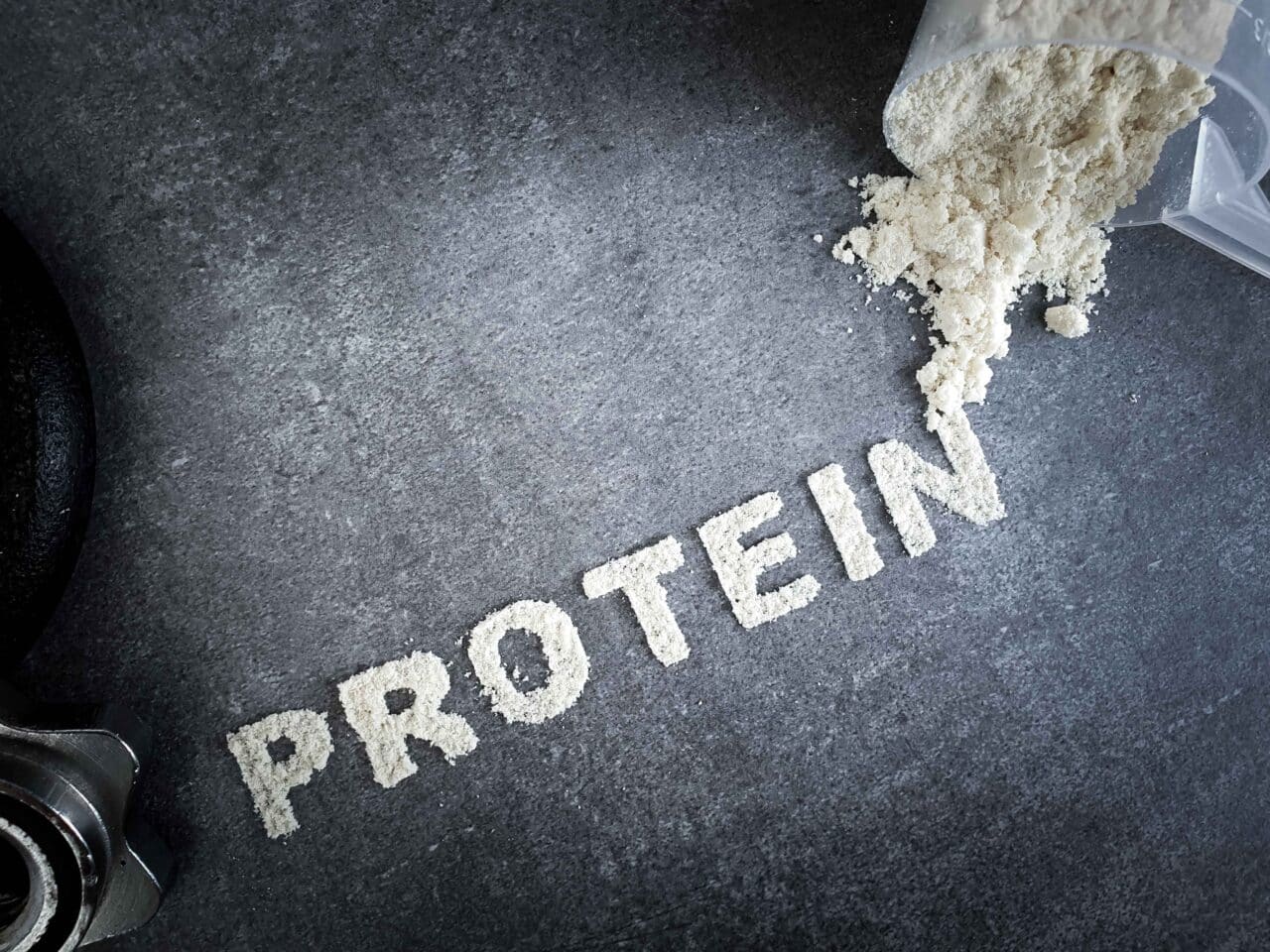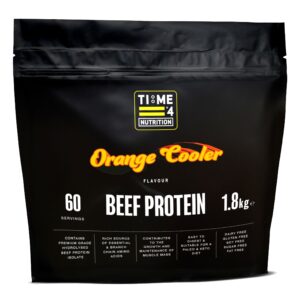What is beef protein powder?
What is Beef Protein Powder?
In recent years there has been a rise in popularity of a range of diets that emphasise the consumption of meat, particularly red meat, such as the Paleo, Keto, Carnivore and Lion diets. Although these may seem to be recent concepts in the field of human nutrition, meat was incorporated into the diet of our ancestors at least 2·6 million years ago (11), while cows were first domesticated 10,500 years ago. The consumption of meat has played a key role in human evolution. It has been suggested that without the inclusion of animal source foods in the diet, it is unlikely that evolving man could have achieved their unusually large and complex brain while simultaneously continuing their evolutionary trajectory as large, active and highly social primates (11). It has also been suggested that a high protein diet consisting of red meat, fish and dairy combined with a physically active lifestyle and favourable genetics was responsible for the Vikings’ impressive stature, as they were typically significantly bigger than their contemporaries.
Red meat, particularly beef, continues to play an important role in human health and performance by providing a rich source of high biological value protein and essential nutrients, some of which are more bioavailable than in alternative food sources (11).
For example, a recent study (9) compared muscle protein synthesis rates following the consumption of a meal containing 100g of lean beef with a vegan meal. Even though the meals contained the same amount of protein and energy (kcal), the beef-based meal produced a muscle protein synthesis rate 47% greater than the plant-based meal.
Numerous studies have now shown that supplementation with beef protein can provide a range of benefits for health and performance, particularly for those engaged in demanding exercise. These include, but are not limited to:
- Increasing muscle protein synthesis (3, 4, 7, 9)
- Increasing muscle mass (1, 5, 6, 9)
- Increasing protein intake (1)
- Increasing strength (1, 5, 6)
- Increasing satiety (2)
- Increasing fat loss (2, 5)

What is Beef Protein?
As the name suggests, beef protein is a high-quality protein derived from cows. Time 4 Beef Protein Powder contains only beef protein of the highest quality, providing 27g of protein per 30g serving with only 0.7g of carbohydrate. It is an isolate, which means it is highly purified and has had all the fat and virtually all the carbohydrate removed to provide a first-class protein, packed with a full range of essential and branch chain amino acids, which is quickly absorbed by the body. It is also hydrolysed, having undergone a process to break the protein down into smaller fragments to facilitate rapid and easy digestion. It is dairy and lactose free, and contains no gluten, soy, fat, or sugar. This makes it an ideal supplement for anyone wishing to increase their protein intake while avoiding lactose and reducing the sugar and fat content of their diet. It is also suitable for those following a Paleo or Keto diet.
What Does the Science Say about Beef Protein?
Here at Time 4 Nutrition, we pride ourselves on employing the findings of the latest cutting-edge research to produce the most effective, innovative, evidence-based products.
As we review a selection of the research that supports the use of beef protein, you will begin to see why Time 4 Beef Protein Powder is such a great product and how it may benefit you.
Can Beef Protein Increase Muscle Protein Synthesis?
It is well acknowledged that dietary protein is essential for muscle growth and repair, but not all protein sources are created equal when it comes stimulating muscle protein synthesis. For example, the study by Pinckaers et al., (7), cited earlier, showed that that the ingestion of a beef-based meal produced a muscle protein synthesis rate 47% greater than an equivalent plant-based meal.
A number of other studies have also demonstrated beef protein’s ability to stimulate muscle protein synthesis (3, 4, 9, 10).
Symons and colleagues (3) found that 30g of beef protein increased muscle protein synthesis by approximately 50% in both young and older individuals. While the results of a study by Burd et al., (10) showed that beef protein was as effective as milk protein in stimulating muscle protein synthesis rates in the 5-hour post-exercise period and in the longer term.

Can Beef Protein Increase Muscle Mass?
The ability of dairy proteins, such as whey, to stimulate muscle growth in response to resistance training has long been established by numerous studies (10). More recently, the effectiveness of beef protein to stimulate muscle growth has been investigated with promising results (1, 5, 6, 7). Sharp et al., (5) compared the effects of beef protein isolate, chicken protein and whey protein concentrate on muscle mass in response to 8 weeks of resistance training. The results showed that all 3 protein sources produced significant increases in muscle in comparison to a carbohydrate placebo.
Naclerio and colleagues (6) conducted a double-blind randomised control trial, considered to be the ‘gold standard’ in research, to assess the effects of beef protein, whey protein and a carbohydrate supplement on body composition in response to 8 weeks of resistance training. The results showed that beef and whey protein produced significant and comparable increases in muscle mass, with no such effect observed for the carbohydrate supplement.
These results were further confirmed by a review of 7 studies (1), which showed that whey and beef protein produced similar increases in muscle mass in response to resistance training.
Is Beef Protein an Effective Way of Increasing Protein Intake?
According to the International Society of Sports Nutrition, a protein intake of approximately 2 grams per kilogram of body weight per day (g/kg/d) is required to maximise gains in muscle growth. In addition, there is some evidence that suggests higher protein intakes (>3.0 g/kg/d) may be beneficial when attempting to maintain muscle while reducing body fat levels (10).
Consuming this amount of protein can be a challenge for many people, particularly when considering that your protein intake should ideally be evenly distributed, every 3–4 hours across the day (10). For example, if you weigh 100kg, you will need to be consuming around 200g of protein per day. This is where beef protein can make a valuable contribution to your protein intake. A study by Valenzuela et al., (1) showed that adding a beef protein supplement to an individual’s daily nutrient intake provided a significant increase in protein, which resulted in an increase in muscle size and strength.

Can Beef Protein Increase Strength?
Like building muscle, nutrition also plays an important role in the development of strength. There is now an emerging body of evidence that demonstrates the efficacy of beef protein for the development of strength when combined with a suitable resistance training programme (1, 5, 6,).
The results of a review by Valenzuela and colleagues (1) showed that supplementation with beef protein not only produces a significant increase in lean body mass but also muscular strength.
Naclerio et al., (6) investigated the impact of ingesting beef protein, whey protein, and carbohydrate on strength performance (1RM) following an 8-week resistance-training program. Participants ingested 20g of supplement, mixed with orange juice, once a day immediately after workout or before breakfast. The results showed that only the beef protein and whey produced significant increases in 1RM bench press with no increases in strength observed in the carbohydrate group.

Can Beef Protein Enhance Fat Loss?
The two components of body composition that are typically of greatest interest to the majority of people and are most amenable to change as a result of diet and exercise, are muscle mass and body fat. As we have already seen, beef protein can aid muscle gain and there is now an increasing body of scientific literature demonstrating its ability to enhance fat loss (2, 5).
A comparison of the effects of beef protein isolate, chicken protein and whey protein concentrate on body composition in response to resistance training, showed that all 3 protein sources produced a significant reduction in body fat in comparison to a carbohydrate placebo (5).
Dietary proteins have been found to influence body fat by affecting four targets for body weight regulation: satiety, thermogenesis, energy efficiency, and body composition (2). For example, diet-induced thermogenesis, the increase in energy expenditure that occurs after consuming food, is higher for protein than the other macronutrients. Specifically, diet-induced thermogenesis increases after protein ingestion by 20-30 %, but by only 5-10 % after carbohydrates and 0-5 % after ingestion of fat. This effect is even greater with animal proteins containing larger amounts of essential amino acids, such as beef protein, than with vegetable proteins.
The results of a review by Keller (2) showed that higher protein consumption during dietary treatment of obesity resulted in greater fat loss than dietary interventions containing lower amounts of protein in studies lasting up to one year. Additionally, an increased protein intake helped to prevent the loss of muscle that tends to accompany weight loss.
Can Beef Protein Increase Satiety?
While hunger is the sensation of needing or wanting food, the term ‘satiety’ refers to the feeling of fullness associated with eating, or in other words, feeling satisfied. For various reasons, some people struggle to achieve this state, which can lead to overeating or the consumption of unhealthy foods, resulting in an increase in body fat. Failure to achieve satiety also makes it difficult to maintain a fat loss eating plan. Therefore, satiety is not just important for individuals struggling to attain and maintain healthy body fat levels, but also for athletes and bodybuilders who need to reduce their dietary intake for a period to decrease body fat in preparation for competition. The consumption of high protein foods, such as beef protein, have been shown to produce higher ratings of satiety than carbohydrates or fat with same calorie content. This is mainly due to the oxidation of amino acids (2).

Beef Protein Versus Dairy Proteins: Is it a Case of Either/Or?
If you are unable to consume dairy proteins, then beef protein would be an ideal choice of supplement due to its high amino acid content and easy digestibility. However, if you do not have any issues with dairy, then it would be very reasonable to ask the question why do I need beef protein powder if I already use a dairy protein supplement such as whey protein, which has an excellent nutrient profile?
To answer to this question, we first need to understand a little of the science. Research shows that while whey protein is initially more rapidly digested and absorbed than beef, thereby resulting in a higher stimulation of muscle protein synthesis in the first 2 hours post-exercise, the same cannot be said for the whole recovery period, during which time whey and beef have a similar effect. This is also true for the longer term (4 weeks or more), when whey and beef protein have also been shown to have very similar effects on muscle mass (9). Therefore, both can be included in a comprehensive nutrition strategy based on individual preferences and circumstances. For example, you may feel hungry immediately after training and would appreciate the fuller feeling that you experience after consuming the thicker consistency of a whey protein supplement, which is comparable to a milk shake. However, there be other times when you still need to consume a highly quality source of protein but would find the fruit squash like consistency of Time 4 Beef Protein powder more palatable, allowing you to ingest the recommended intake of branch chain and essential amino acids in a format that it as easy to consume as drinking a glass of water.
The take home message is that whey and beef protein are not mutually exclusive, i.e., just because you consume Time Whey Protein Professional does not mean that you cannot also use Time 4 Beef Protein. Both can make an important contribution to your protein intake by accommodating your changing dietary needs and preferences throughout the day and your training cycle.

In Summary….
Beef has been an important part of the human diet for thousands of years and has played and an influential role in our evolution. Research shows that when included as part of a healthy, varied diet, it provides a rich source of high biological value protein and essential nutrients, some of which are more bioavailable than in alternative food sources. Recent advances in food technology mean that we can now enjoy the benefits of the protein portion of beef, which include increases in muscle size and strength and a reduction in body fat, in a convenient, easy to consume liquid form. This is where Time 4 Beef Protein Powder can make a valuable contribution to your nutrition strategy, as it contains only beef protein of the highest quality, providing 27g of protein per 30g serving with only 0.7g of carbohydrate. It is an isolate, which means it is highly purified and has had all the fat and virtually all the carbohydrate removed to provide a first-class protein packed with essential and branch chain amino acids, which is quickly absorbed by the body. It is also hydrolysed, having undergone a process to break the protein down into smaller fragments to facilitate rapid and easy digestion. It is dairy and lactose free, and contains no gluten, soy, fat, or sugar. This makes it an ideal supplement for anyone wishing to increase their protein intake while avoiding lactose and reducing the sugar and fat content of their diet. It is also suitable for those following a paleo or keto diet. The benefits of Time 4 Beef Protein Powder do not end there: it has been designed to mix easily in water and comes in a range of delicious flavours. Isn’t it time for you to beef up your protein intake?

